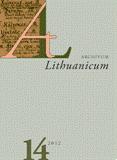Untersuchungen zu Daukšas Postille – I. Doppelungen
Research in Daukša's Postille 1: Deppelling
Author(s): Wolfgang HockSubject(s): Theoretical Linguistics, Semantics, Historical Linguistics, Baltic Languages, Translation Studies
Published by: Lietuvių Kalbos Institutas
Keywords: Dauška; Postille; Deppelling; Doppelung; Semantics; Old Lithuanian texts;
Summary/Abstract: The German term ‘Doppelung’ refers to the occurence of two (seldom three) semantically equivalent words or phrases in a translated text that correspond to a single word in the source document. Subject of the present article are correspondences of this type between Daukša’s Poſtilla Catholicka (DaP, 1599) and Wujek’s Poſtilla Catholicka Mnieyſza (W3, 1590). The cases in question are collected as completely as possible and analyzed linguistically. The linguistic description encompasses formal and semantic aspects such as presence or absence of conjunction, type of conjunction, distribution and the nature of the semantic equivalence. It turns out that the linguistic term ‘synonymy’ is too narrow to cover the whole range of semantic relations between the members of the equivalences in question. Arguments are provided for the view that this kind of equivalence is neither an exclusive feature of Daukša’s language nor of Old Lithuanian or of translated texts. Rather, it reflects the extensive use of one of the most central Renaissance figures of speech, ‘synonymia’ (also called ‘interpretatio’ or ‘paraphrasis’). The key role of this figure in the 16th century can be traced to the pre-eminence of one textbook, De copia of Erasmus of Rotterdam, which strongly influenced Renaissance education in both Western and Eastern Europe.
Journal: Archivum Lithuanicum
- Issue Year: 2012
- Issue No: 14
- Page Range: 9-98
- Page Count: 90
- Language: German

